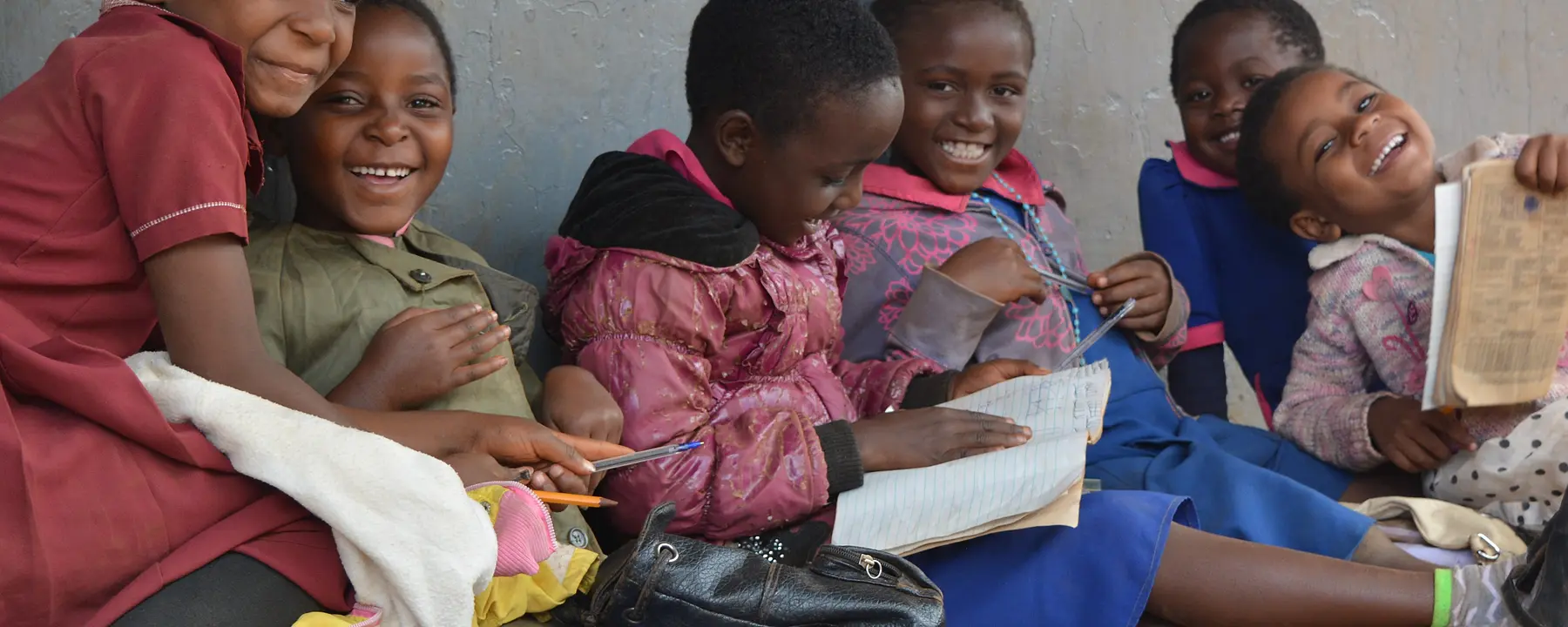Support to Ministry of Education and Increased Collaboration among Teachers, Families, and Local Community Leaders Helped Improve Reading Outcomes for Malawian Students in Grades 1-4.
Objective: Improve reading outcomes for Malawian students in grades 1-4
Approach: Provide technical assistance, instruction, and resources in the classroom and community to deliver improved reading instruction in Chichewa and English.
Impact: MERIT led the development of new Standard 1-4 learner books and teacher guides, trained over 66,000 Standard 1-4 teachers and 10,000 education administrators, led the development of 97 supplementary readers, and printed and distributed over 11 million teaching and learning materials, including books in braille, that were distributed to 5,600 schools.
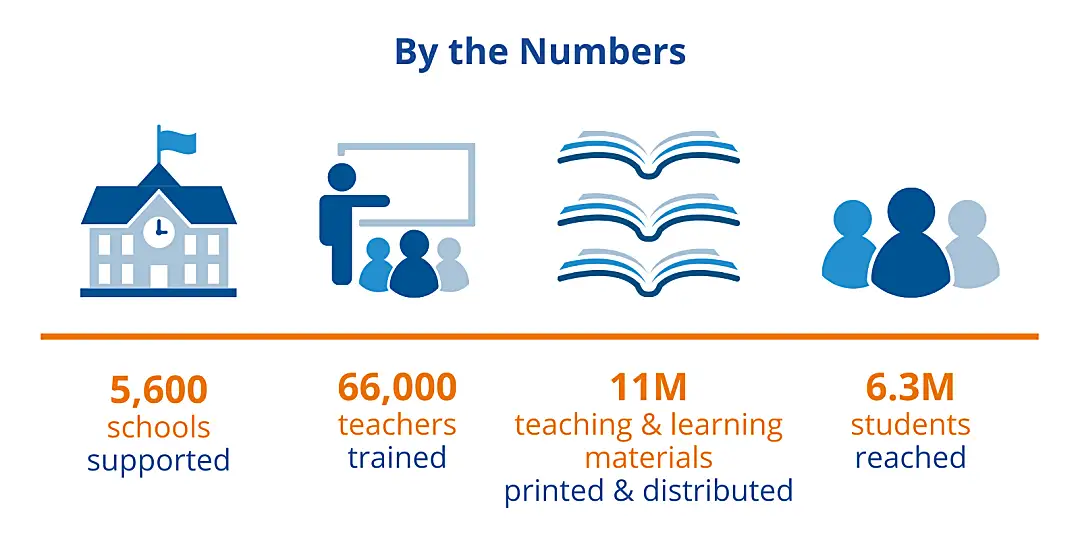
A quality education is critical for the future of Malawi’s children. Yet, the country consistently ranks below average within the Southern African Region in terms of access and indicators of quality. The U.S. Agency for International Development’s (USAID’s) Early Grade Reading Barometer indicates that in 2012, 90 percent of Malawian second graders were unable to read a single word of a grade level text; by 2018, this level had improved only slightly to 81 percent. An inadequate supply of teachers, quality learning materials, and infrastructure, contribute to poor student performance. Recognizing these problems, in 2016 the Government of Malawi developed its National Reading Program (NRP). Since its inception, USAID has partnered with Malawi’s Ministry of Education (MOE) to support the NRP.
From 2015 to 2021, USAID provided support through its flagship MERIT: Malawi Early Grade Reading Improvement Activity, led by RTI, and supported by partners Infonex, SIL-LEAD, Viamo, Perkins School for the Blind, Miske Witt and Associates, Link Community Development-Malawi, and blueTree Group. This five-and-a-half-year Activity supported the MOE and collaborated with government officials, teachers, families, and local community leaders.
MERIT improved instruction for primary grade reading outcomes by
- providing and expanding access to teaching and learning materials
- ensuring safe learning spaces
- supporting teachers and coaches
- strengthening the relationship between families and schools, and supporting government and community ownership of reading interventions.
Benefit of Improved Teacher Training and Instruction
Through MERIT, Standard 1-4 teachers received training and resources meant to improve instructional practice. One method they learned through their training is ‘I Do, We Do, You Do’. This method, part of a structured pedagogy approach, a best practice as documented in RTI’s Science of Teaching research, has teachers first illustrate a skill, practice the skill with their students, and then have the students perform it. Another means was to encourage teachers to provide print-rich classrooms, by labeling items and other use of text around their rooms, for students to practice reading in Chichewa and English.
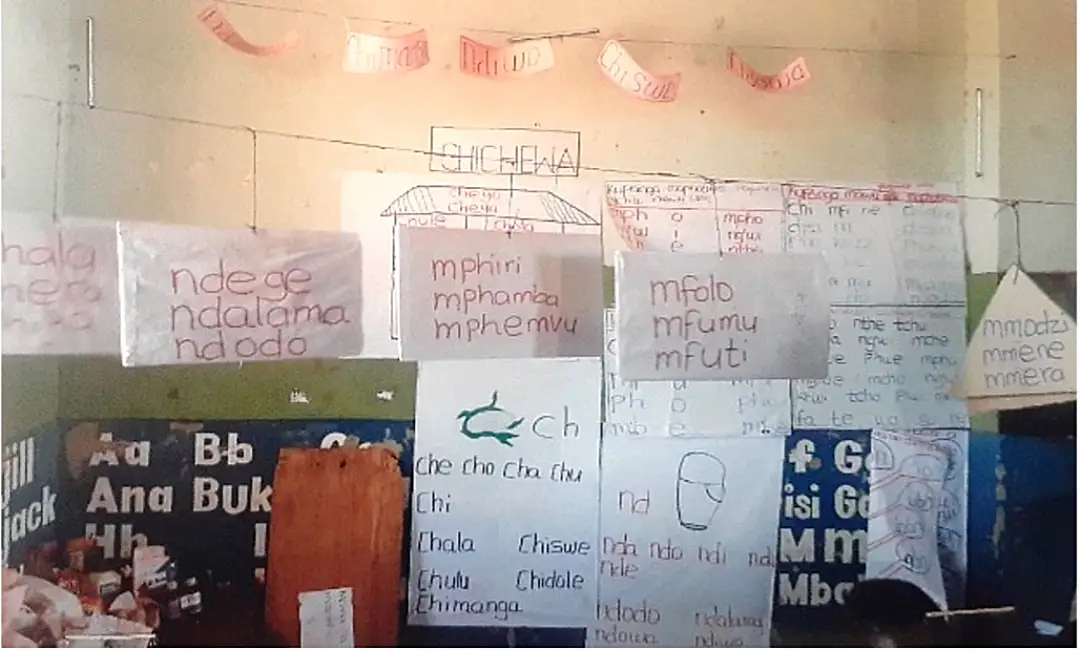
Ms. Tamaria Kaliati of Mkomadzi Primary School has taken this training and applied it successfully. Her classroom was full of well-written charts and labeled objects. One corner of her classroom featured an area where students can shop for various items, with items labeled for the students to read and practice as they do their shopping. Ms. Kaliati instituted other activities throughout the day for students to retain their new skills, for example, she asked students to read or recount a word or sentence they have learned before they return home. Ms. Kaliati credits the instruction provided by MERIT for her students’ success. “Out of 70 learners, a total of 30 learners are now able to read both Chichewa and English. At the beginning of the school year, only fewer than five were able to read,” she said.
Validation of the ‘I Do, We Do, You Do’ approach can be seen through Teleza, a fourteen-year-old who repeated Standard 4 at Kaponyatola Primary School. Her teacher, Mrs. Chilundu, applied MERIT training to spend more time with Teleza and improve her poor grades and reading skills. “I believe that the approach of ‘I Do, We Do, You Do’ helps learners to grasp reading skills faster. In my class, when I notice that learners do not understand, I model, they watch, and then I practice together with them. Later, I allow them to practice on their own,” Mrs. Chilundu explained. This has paid off. Teleza moved on to Standard 5.
Supporting Teachers during COVID-19
With the onset of the pandemic, the team shifted its plans for training instructional leaders. Based on the technology and platforms most widely available to training participants, MERIT chose an interactive voice response (IVR) approach. IVR automatically calls participants who listen to pre-recorded messages and content and are quizzed and respond using their phone’s keypad.
With the support of partner Viamo, MERIT designed and launched a two-week remote training that included SMS messages, introductory voice calls, content messages, small group discussions and review calls. This large-scale remote training approach allowed MERIT to safely reach over 15,000 instructional leaders, including section heads, head teachers and Primary Education Advisors, to refresh their knowledge on how best to support teachers in the classroom. Ongoing monitoring and real-time feedback allowed MERIT to adjust along the way and conclude that IVR is a viable method for refresher training, that should be considered even after students and teachers return to school.
Fostering a Safe Learning Environment
A 2017 National Assessment of Safety, Gender, and Inclusion in 86 public schools found 45% of student focus groups reported having seen a teacher beat a student. To mitigate harmful punishments, Standard 1-4 teachers and education officials in all 5,600+ public primary schools received training through MERIT in positive discipline and gender-equitable practices. With support from partner Miske Witt, teachers learned new practices to create safe learning spaces in their classrooms and support girls and boys equally in their learning, without gender bias.
Mr. Frank Matemba, a Standard 1 teacher at St. Michael’s Primary School, became more fully aware of the consequences of gender bias after this training and, more importantly, acted on what he learned. Prior to training, in order to more efficiently teach his 100 students, he had divided his classroom into eight groups with one designated student leader for each group, seven of whom were boys. With insight gained from training, Mr. Matemba re-organized his groups. The leaders for his learning groups were split evenly—four girl leaders and four boy leaders—with selection factoring in highest performing students. Mr. Matemba also encouraged his boy and girl students to be partners together in education, and to help each other instead of mocking those who were struggling. His new practices paid off.
“We like coming to school because we have a good teacher who is not a threat to us,” said Tiyamike, one of the four girl leaders.
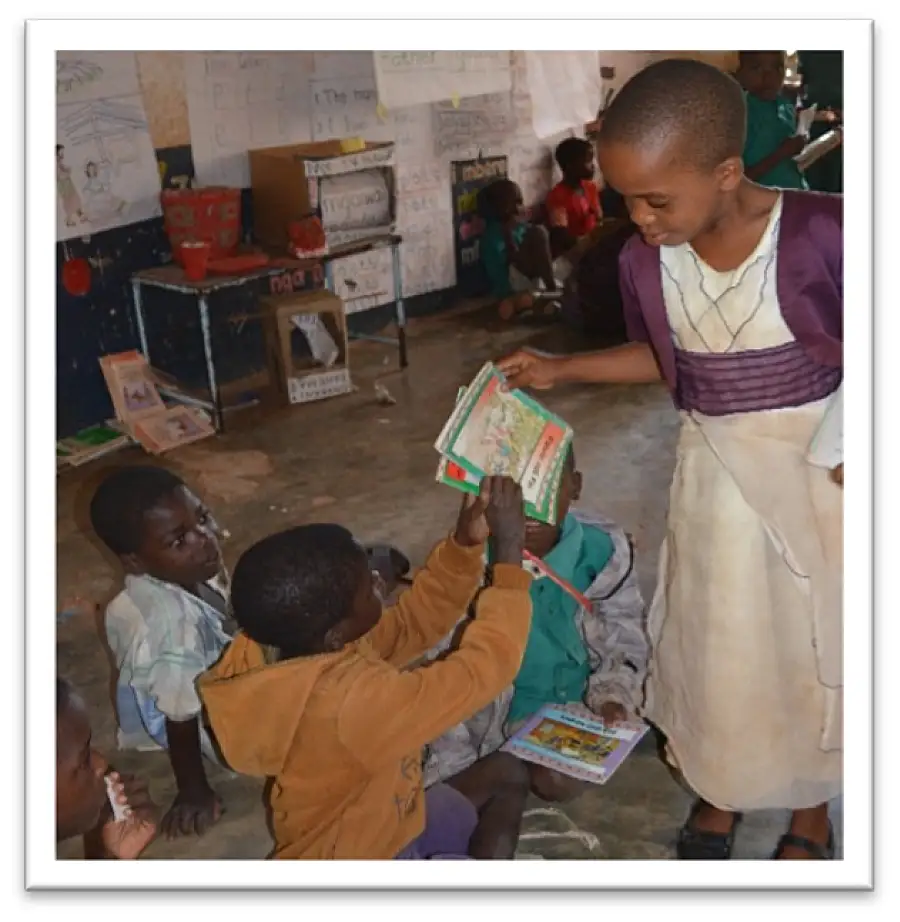
Changing the Perception of Children with Disabilities
Children with disabilities should have the same opportunity to learn as their peers. MERIT, with the support of Perkins School for the Blind, worked with the NRP to raise awareness about teaching children with disabilities by creating and providing disability-specific materials, such as materials in braille, alongside training on their use. “The knowledge and skills gained from these trainings have helped me to provide relevant support for children with special needs within my school,” said Ms. Marry Banda, a teacher at the Chimwala II Primary School. “As head teacher, I am also better able to practice inclusive education by ensuring that the needs of children with special needs are addressed,” she added.
A young boy in Standard 3 from Lilongwe Local Education Authority, Haloon Kasimu, was just one of many students who demonstrated great improvement in learning as an indirect recipient of MERIT’s training. Affected by cerebral palsy and difficulty hearing, made great strides in reading after his teacher, Mrs. Sikero, attended training on literacy instruction for children with disabilities and learned new ways to engage Haloon in class.
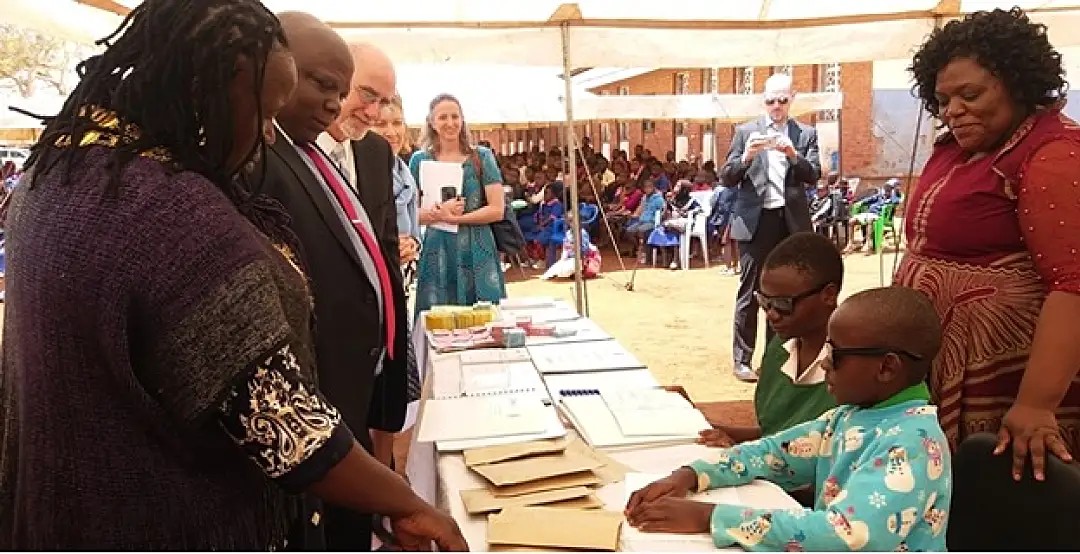
Positive Change through Parental and Community Engagement
MERIT worked to encourage parents and communities to promote and be directly involved in their child’s reading. In the first phase of MERIT, with the support of Link, MERIT trained school management committees, parent-teacher associations, and school mother groups across Malawi on how to support children’s reading at home. MERIT later carried out a communications campaign that emphasized parents spending time reading with their children through radio messages, billboards, and posters.
Wongani, a student at Chiteko School, began reading with her parents after her father listened to a radio message encouraging at-home reading activities. These radio messages were funded by MERIT and developed in collaboration with the MOE. “My daughter was not able to read even a single syllable at the end of the first term in Standard 1. My wife and I decided to start teaching her letter names and reading at home,” said Wongani’s father. Using his daughter’s schoolbooks, developed with technical assistance by MERIT and now available through the NRP, they spent every evening after school practicing. By the end of her third term in Standard 1, Wongani was a star in the class and took first position in year-end exams.
MERIT Collaboration and Sustained System-wide Improvement
In the last few years of MERIT, USAID expanded its support to NRP by adding complementary programs to the Malawi portfolio. MERIT played a leading role in coordinating the activities of the various partners to ensure a streamlined approach to supporting the NRP. MERIT also led joint activities, such as teacher-trainings, and leveraged technical expertise across the different projects, leading to cost savings and more efficient implementation.
By focusing its capacity building approach on three core functions that our research shows supports learning at scale—setting and communicating expectations, monitoring against those expectations, and providing basic inputs to all schools and targeted support to struggling students—and by working closely with and through local and government systems, MERIT fostered an environment for Malawian ownership of the reading interventions and its results.
- U.S. Agency for International Development (USAID)
- Infonex
- Miske Witt & Associates International
- Link Community Development—Malawi
- Perkins School for the Blind
- SIL LEAD
- blueTree Group
- Viamo
